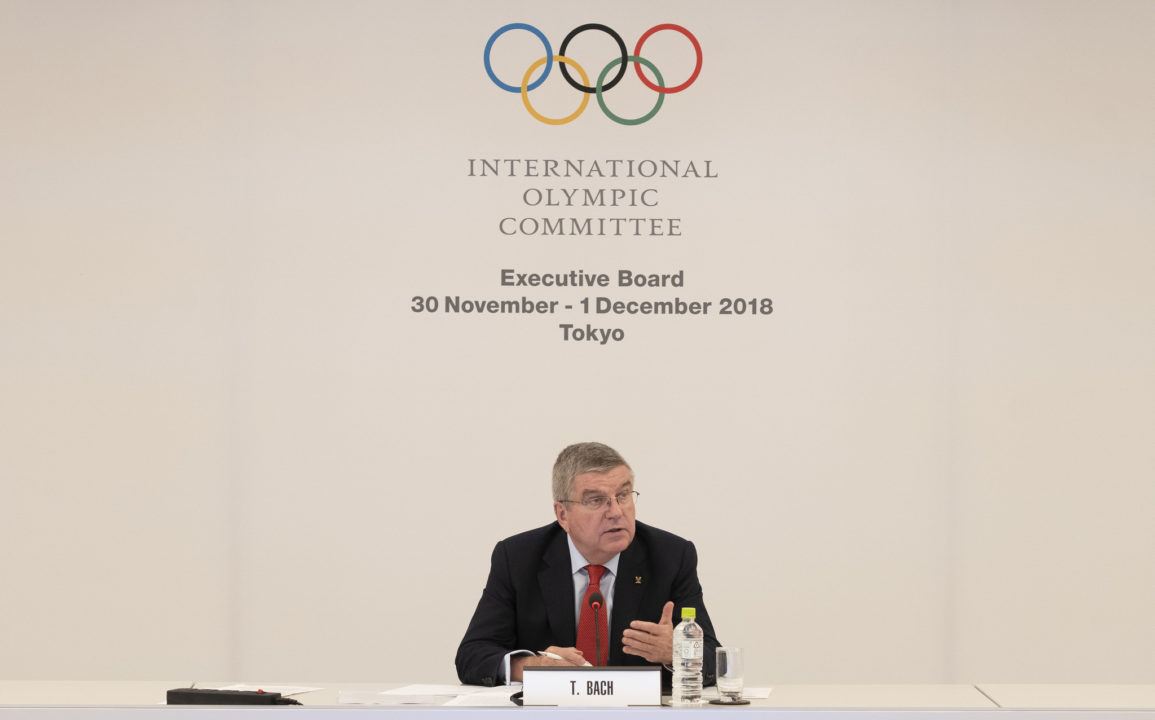The race to succeed Thomas Bach as President of the International Olympic Committee (IOC) in 2025 has officially begun, with seven candidates presenting their visions for the future of the organization. The new president will serve an eight-year term, with the option to seek a second four-year term, potentially shaping the Olympic Movement until 2037.
Historically, IOC leadership has been predominantly male, with Kirsty Coventry standing out as the only woman running in this election and only the second woman ever to seek the position. Coventry, a seven-time Olympic medalist and the most decorated African Olympian in history, would also make history as the first swimmer to ascend to the presidency. She is joined by Sebastian Coe as the only other Olympian among the candidates. Coe, a two-time Olympic champion in track and field, brings an impressive leadership resume as well, including the successful organization of the 2012 London Olympics.
The candidates’ platforms converge on several key themes, including calls for greater athlete empowerment, enhanced sustainability, and the modernization of the Games. Here’s a breakdown of each candidate’s platform, presented in alphabetical order:
1. Prince Feisal Al Hussein, 61 (Jordan)
Prince Feisal, an IOC member since 2010 and the brother of King Abdullah II of Jordan, envisions a future for the Olympics centered on unity, sustainability, and inclusion. His “Olympic Agenda 2036” reimagines the Youth Olympic Games by combining a festival-like atmosphere with elite competition, adopting climate-conscious scheduling, and leveraging digital platforms to engage with diverse host cities. He also advocates for stronger regional IOC representation and reinstating member voting for host city selection. Prince Feisal sees the IOC as a global catalyst for peace and development through sport.
Key Proposals:
- Revamping the Youth Olympic Games with a modern twist.
- Climate-adaptive scheduling to attract a variety of host cities.
- Opening regional IOC offices.
- Bringing back member voting for host city decisions.
2. Sebastian Coe, 68 (Great Britain)
Sebastian Coe, President of World Athletics and an IOC member, offers a leadership model focused on accountability and innovation. His “STAGE” platform—Sport First, Tomorrow’s Generation, Athletes at the Heart, Growth, and Empowerment—puts athletes at the center with equitable financial recognition, enhanced anti-doping measures, and safeguarding women’s categories. Coe also emphasizes engaging youth through digital innovation and decentralizing IOC decision-making. A proposed mid-term referendum would allow members to assess his leadership.
Key Proposals:
- Mid-term performance evaluations for transparency.
- Financial programs rewarding athletes for their impact.
- Strengthened anti-doping efforts and protection for women’s sports.
- Youth-focused digital modernization and shared decision-making power.
3. Kirsty Coventry, 41 (Zimbabwe)
Kirsty Coventry, Zimbabwe’s Minister of Sport and a decorated Olympian, focuses on athlete well-being, gender equity, and digital engagement. As the first swimmer to run for IOC president, Coventry prioritizes mental health support, expanding roles for women in sports, and using AI to connect with younger audiences. Her manifesto also highlights sustainable practices for host cities and the need for transparent governance. Inspired by the Ubuntu philosophy, she aims to foster global solidarity and address societal challenges through the Olympic Movement.
Key Proposals:
- Comprehensive mental health programs for athletes.
- Expanding opportunities for women in sports.
- Using AI to attract and engage younger audiences.
- Promoting sustainability and transparency in governance.
4. Johan Eliasch, 62 (Great Britain)
Johan Eliasch, head of the International Ski & Snowboard Federation, combines environmental advocacy with business acumen. His “Forest City Initiative” proposes preserving rainforests equivalent in size to Olympic host cities. Eliasch also supports a system of rotating the Winter Games among permanent locations to reduce environmental strain. His vision includes embracing digital storytelling and AI-powered tools to modernize training, judging, and operational efficiency.
Key Proposals:
- Preserving rainforests through the “Forest City Initiative.”
- Rotating Winter Games across permanent sites.
- AI-driven innovations for training and judging.
- Engaging younger audiences with dynamic digital storytelling.
5. David Lappartient, 51 (France)
David Lappartient, President of the Union Cycliste Internationale, aims to tackle climate change, integrate esports into the Olympic Movement, and reform governance. His agenda includes cost-effective Games to attract diverse host cities, achieving gender parity in IOC membership by 2036, and increasing athlete representation. Lappartient advocates for transparency and neutrality in IOC operations while using sports to bridge social divides.
Key Proposals:
- Achieving gender parity in IOC membership by 2036.
- Introducing esports into the Olympics.
- Reducing costs to make hosting the Games more accessible.
- Promoting transparency and neutral governance.
6. Juan Antonio Samaranch, 65 (Spain)
Juan Antonio Samaranch, son of a former IOC president, outlines a plan to boost IOC revenues and athlete engagement. He proposes a $1 billion Olympic Donor Programme and new sponsorship opportunities, along with giving athletes access to performance videos for personal promotion. His platform includes revisiting IOC age limits and reinstating member voting on host city selection. Samaranch envisions IOC members as global ambassadors who champion both sport and health.
Key Proposals:
- Launching a $1 billion Olympic Donor Programme.
- Providing athletes with performance videos for self-promotion.
- Restoring member voting for host city decisions.
- Promoting physical activity alongside education.
7. Morinari Watanabe, 65 (Japan)
As head of the International Gymnastics Federation, Morinari Watanabe proposes a bold new Olympic model. His vision includes staging the Games across five cities on different continents, creating 24-hour global broadcasts and reducing the burden on individual hosts. Watanabe also advocates for a bicameral governance structure, an Olympian Forum for athlete interaction, and AI-driven solutions for coaching and compliance. His platform focuses on using the IOC to address global health challenges through sport.
Key Proposals
- Hosting the Olympics across five cities on different continents.
- Introducing a bicameral governance model.
- Establishing an Olympian Forum for athlete engagement.
- Leveraging AI to improve coaching and compliance.

Coe is the only one who makes sense from an athlete’s point of view and when you take all the criticism of the last couple of… decades… into account.